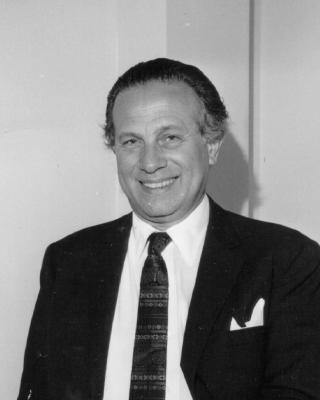|
LIFE'S FULFILMENT

BILL NEWMAN recalls the affection he felt for
the great Hungarian conductor-composer Antal Doráti,
who would have been 100 years old today
Older readers will have already read my article Working alongside Doráti which appeared in Classics magazine [no longer available] in July 1992. I wrote it with some degree of accuracy, and looked back to the enjoyable times that allowed me access to Mercury Classical recording sessions at Watford (now known as a 'Colosseum') and Wembley (retitled 'Brent') Town Halls during the late 1950s and early 1960s. Under contract to EMI for UK sales and distribution, the American-based company was celebrated for a revolutionary recording technique discovered by Robert C Fine -- namely, three equidistant microphones providing a perfect stereo balance to replace the single Telefunken for mono. The enormous impact this gave to musical performances coupled with rave press reviews is past history, but the audio message behind the product lives on to create new marketing images for the international celebrities and recording team who took part.
Doráti was 52 when we first met in 1958. Full of physical energy and new, creative ideas he had just severed connections as permanent conductor with the Minneapolis (now Minnesota) Symphony Orchestra and was about to embark on new recording sessions with the London Symphony. Kensington's De Vere Hotel became the focal travelling point between the Royal Festival Hall and Watford, a Kent Car allowing suitable access to both outside the usual rush hour buildups. Usually, the driver picked me up at Marble Arch where I lodged at the time, and our musical discussions allowed me to make promotional plans in advance. Unfortunately, I nearly lost my job in commissioning Flair Photography to take pictures at a RFH concert rehearsal -- 100 pounds was then quite a lot of money for EMI to part with, especially when I failed to request permission beforehand! Apart from several choice photos, some prints are still in the company archives. Musicians, however, are often fussy about having their picture taken. Later on, the famed Angus McBean was continuously scowled at while adjusting his arc lights -- but by this time it was Mercury in the States' turn to suffer Doráti's decision to destroy every one.
When Doráti returned to his usual haunt the following year, he discovered that the family front room had been mistakenly allocated to another party. He went beserk and I was asked to leave, with his family unable to calm a very embarrased hotel management. This became the prelude to an onslaught. Next day, an abortive rehearsal of Mahler's Das Lied von der Erde led to the soloists Aafje Heynis and Murray Dickie being screamed at for failing to phrase their lines with the right expression. During the concert itself, the conductor did most of the singing! But more often every tantrum was offset by a carefree flow of events that brought forth the praises of listening public and critics alike. The LSO during that time were a young body of players under their Irish leader Hugh Maguire. Neville Marriner was in charge of the second violins, Simon Streatfield principal viola and Kenneth Heath, first cello. Oliver Knussen's Dad, Stuart was the formidable double-bass par excellence. In the woodwinds, Alex Murray, Roger Lord, Gervase de Peyer and William Waterhouse blended their virtuousity quite marvellously as first flute, oboe, clarinet and bassoon, while their brass counterparts were Barry Tuckwell on french horn, Alan Stringer, first trumpet and Dennis Wick, trombone. Dennis Blyth was first timpanist, and I well remember him being directed by the orchestra's manager Ernest Fleischmann in the unusual Busoni first movement cadenza which Joseph Szigeti chose for his recording of Beethoven's Violin Concerto. Doráti, who refused to entertain his older Hungarian colleague's 'Humbug' (his expression) had declined to put in a final appearance.

Antal Doráti
|
Apart from Royal Festival Hall concerts, a notable success in those early years was the series of events at the Swansea Music Festival. Mozart's Sinfonia Concertante K364 with Maguire and Streatfield -- I can remember the congenial laughter, enjoying a joke with Doráti beforehand -- and other magnificent performances. The Sibelius Violin Concerto, soloist Steven Staryk, was also a highlight, closely followed by Berlioz' Symphonie Fantastique, Schubert's 'Great C major' and Strauss's Don Juan. Artists and audience conviviality also featured at an open air performance of Beethoven's Pastoral Symphony when, during the central movements noisy overhead birds and geese prefaced a real thunderstorm at Kenwood, off Hampstead Heath, a regular venue for picnickers seeking the unexpected from music's charms.
Continue >>
Copyright © 9 April 2006
Bill Newman, Edgware UK

|

